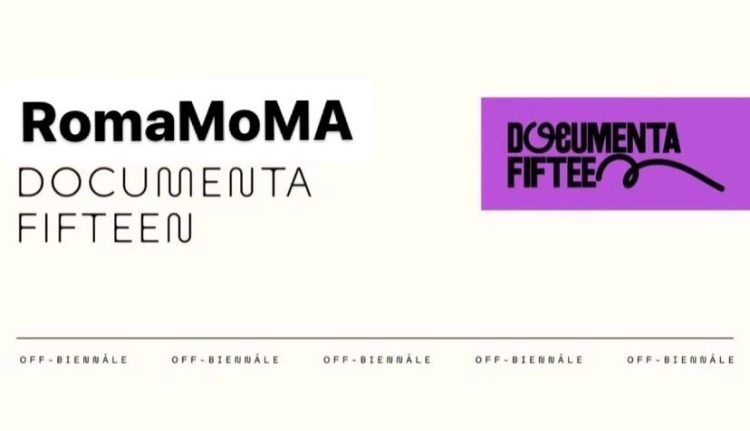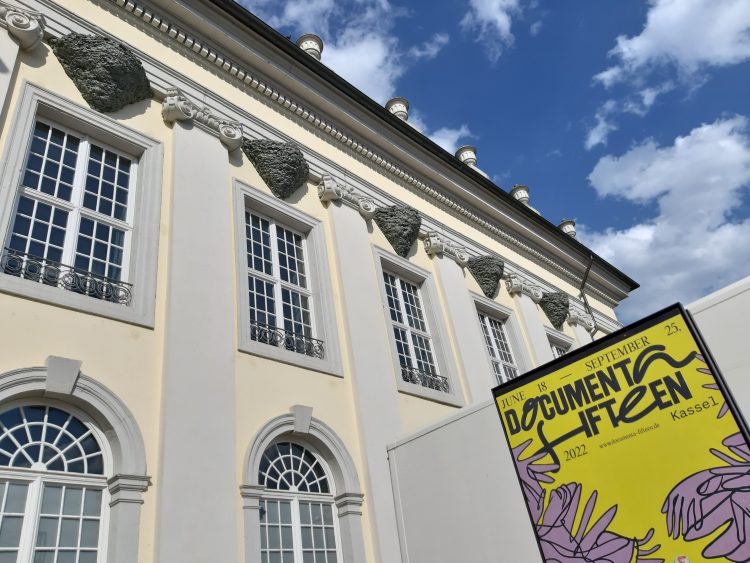One Day We Shall Celebrate Again: RomaMoMA at documenta fifteen

RomaMoMA is a transnational, collaborative and discursive art project of the European Roma Institute of Arts and Culture (ERIAC) and OFF-Biennale Budapest. In Kassel, the group exhibition, One Day We Shall Celebrate Again: RomaMoMA at documenta fifteen, showcases artworks in relation to the idea, question, and (im)possibilities of a “RomaMoMA” (Roma Museum of Contemporary Art). How can the uncanonised cultural heritage and contemporary art by artists of Roma origin be presented in an exhibition setting, when there have been no systematic attempts or institutions dedicated for this task? How is it to define – or should it define – “Roma”, “Roma art”, and “Roma artist” in this context? Are these necessary categories? In the framework of documenta fifteen, One Day… presents the untold past and the unfolding present through artworks and storytelling. The older and younger generations of artists and their differing artistic positions will be highlighted through an installation method that both constructs and deconstructs the idea of a “RomaMoMA”, an imaginary, transnational space for the presentation of artworks.

Sead Kazanxhiu: The Nests, installation within “One Day We Shall Celebrate Again: RomaMoMA at documenta fifteen”. Photo: the artist.
RomaMoMA is a contemporary art project initiating a forum for collaborative reflection on a future Roma Museum of Contemporary Art, with the involvement of local and international, Roma and non-Roma artists, cultural experts, social scientists and the civil sphere. In the form of a contemporary art project, by means of involving stakeholder communities, and exploiting the possibilities of collective thinking and discourse, as well as the critical and discursive potentials of contemporary art, it – “prefiguratively” – “creates” itself: an imagined, and yet real space that is home to both the Roma arts and artists. The suffix in the title, “MoMA” (Museum of Modern Art) is a reference to the prototype of art museums, and it emphasises the dominant role of museums in processes of canonisation, as well as the lack of self-representation by minority groups in museum collections. RomaMoMA aims to engage in dialogue with the above actors across nations. At the same time, RomaMoMA – albeit not affiliated with any government programme or party policy – is a political statement. On the one hand, because the question of the museum is not the private business of the Roma community, because it concerns the redistribution of resources and the transformation of power relations within the society. The focus is not on the realisation of the institution, but on the “act” of conception. It is a discursive and performative process, in the course of which questions regarding the “museum” are discussed with the involvement of every stakeholder: collection strategies, exhibition practice, and art education and mediation methodology, alongside such essential questions as the image the museum should convey of the Roma, and the impact it might have on the impacted (minority and majority) communities. Furthermore, RomaMoMA devotes particular attention to addressing the young public, developing a proprietary methodology for the reinforcement of social dialogue between Roma and non-Roma communities.
Rather than the realisation of a specific museum concept, the project connects a range of programmes (exhibitions, film screenings, performance, workshops, etc.), modelling nomadic, flexible institutional operation, which raises questions and formulates statements with the devices of contemporary art. It aspires to achieve all of this in accordance with the museum approaches of the 21st century, that extend social engagement to reconsidering the relations of museum narratives, cultural heritage and contemporaneity. Although each of the presented artworks contributes to the creative act of the collaborative conception with a unique voice, they share a common desire for narrative, speech and dialogue; their raw material is also shared: contemporary society.
Participating artists: Daniel Baker, János Balázs, Robert Gabris, Sead Kazanxhiu, Damian Le Bas, Małgorzata Mirga-Tas, Omara (Mara Oláh), Tamás Péli, Selma Selman, Ceija Stojka
Curated by Daniel Baker, Ethel Brooks, Tímea Junghaus, Hajnalka Somogyi, Eszter Szakács, Katalin Székely, Miguel Ángel Vargas

[…] Next Blog Entry […]
[…] Previous Blog Entry […]
[…] Friedrichsplatz 18 34117 KasselGermanyeriac.org Instagram / #romamoma Tags: documenta fifteenFolklore & […]